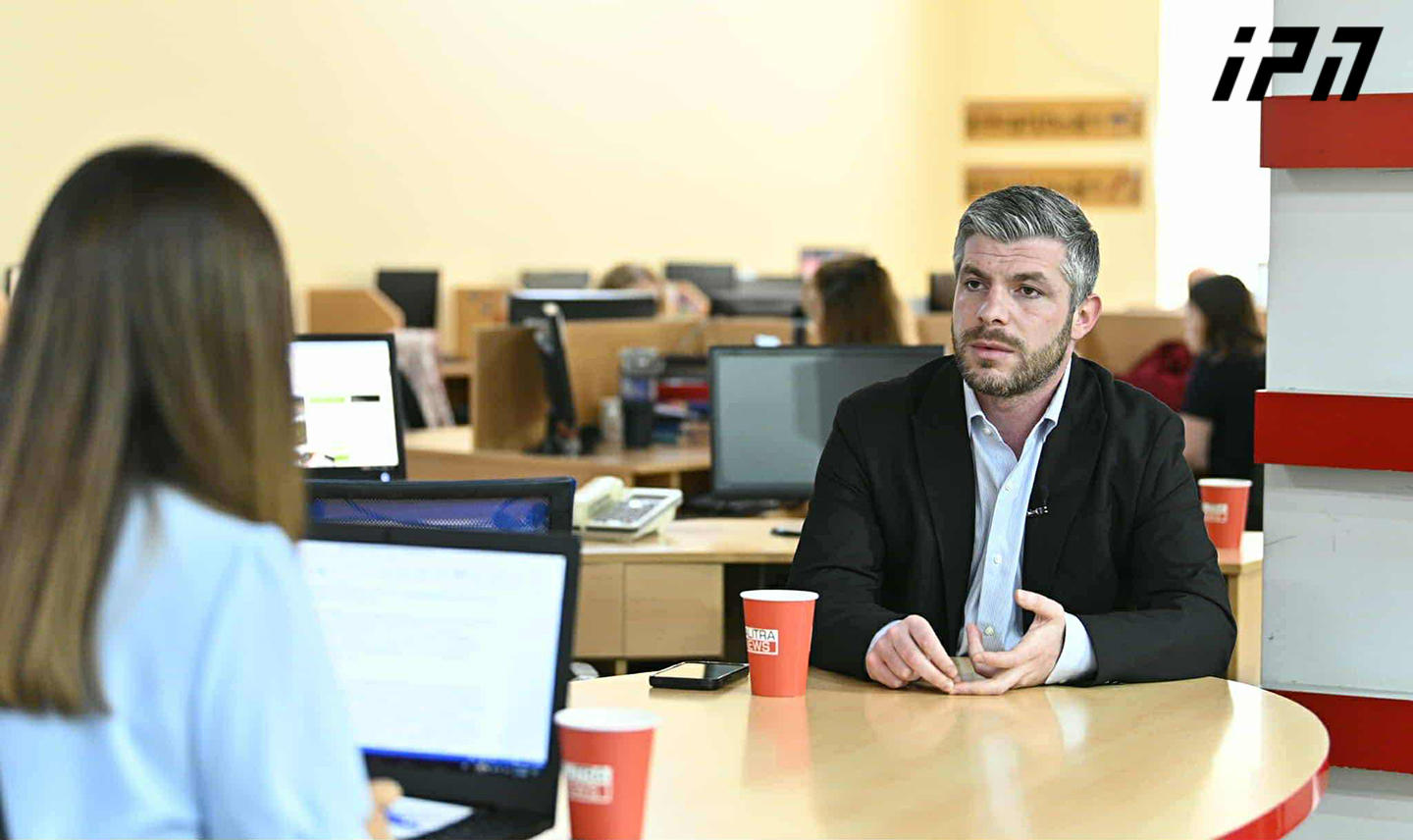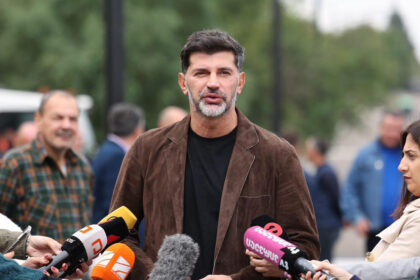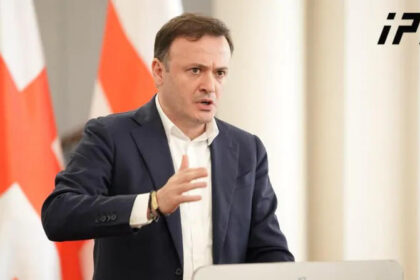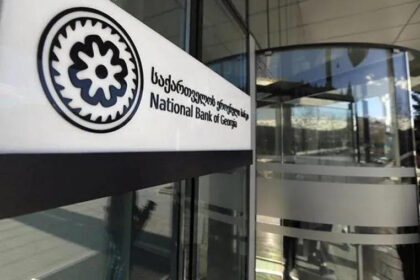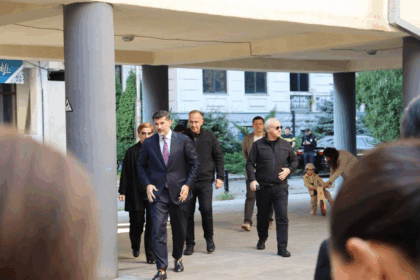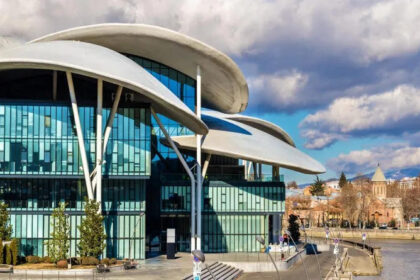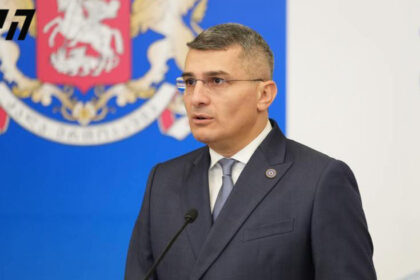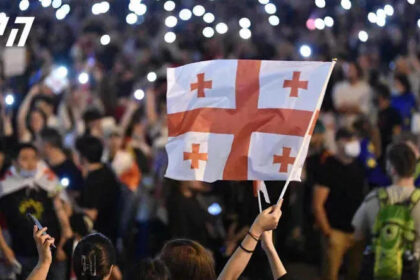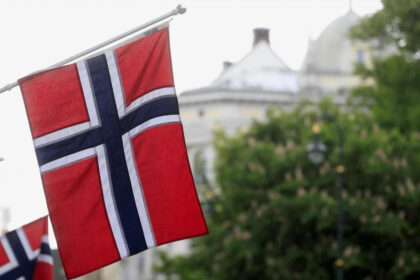During an appearance on Palitranius’s program Day’s Newsroom, Irakli Kupradze, the joint candidate for Tbilisi mayor from Lelo-Strong Georgia and Gakharia for Georgia, stated: “Several very significant names and surnames were considered for Tbilisi’s mayoral candidacy. However, society gave greater preference to a politician. The vast majority of voters I meet plan to participate in the elections. There are only isolated cases where people tell us they don’t believe in elections at all.”
According to Kupradze, he remains firm in his belief that it is possible to reclaim Tbilisi and wrest it from Georgian Dream.
“Discussions [about the Tbilisi mayoral candidacy] went on for a long time. We tried to engage non-partisan candidates as well. The decision was made taking into account all existing factors, including sociological research, public opinion, political decisions, and an emphasis on novelty, among others. That’s why this decision was made—it is both a responsibility and an honor for me to fight to reclaim this city, which is currently burdened with many problems. These elections, of course, will be unfair. It’s impossible for elections to be fair when, a priori, you know that leaders of all parties are detained on political grounds. A criminal case has been opened against Giorgi Gakharia, and he has made the choice not to allow himself to be arrested. Other factors include the potential for and instances of anticipated rigging, pressure, and threats.
There was no issue with persuading non-partisan candidates for the mayoral position. Public research showed that society positively evaluates certain individuals, but only partially supports their involvement in partisan political processes. This was an interesting indicator seen in society, likely influenced by unsuccessful cases like, for example, a footballer mayor in our capital. Or specific sectors where Georgian Dream absorbed public figures from the cultural sphere who later proved to be less competent and overly political in their decisions. Ultimately, society gave greater preference to a politician who has made this work their conscious lifestyle. The decision was made accordingly. Several very important names and surnames were considered, which are significant to me. We didn’t receive rejections from these individuals but rather from society. Society positively evaluates public figures but only partially welcomes their involvement.
[Regarding the meeting with Giorgi Gakharia in Germany], we had a final meeting with Gakharia. Such meetings had taken place before, but now Georgian Dream has sent the State Security Service (SSG) after us. Instead of fighting corruption, spies, and the main problems in this country, the SSG has the time to follow a politician to a private meeting in Germany. Of course, at this meeting, we finalized all important issues. While other parties in the political arena are in conflict with each other, we are trying—and have already succeeded—in establishing a different, exceptionally positive, and good standard of cooperation and unity. Lelo-Strong Georgia and Gakharia’s team have achieved this. We managed to agree on mayors across Georgia and over 1,000 majoritarian candidates for the important cause of preventing Ivanishvili from consolidating power.
Why couldn’t we achieve this for the 2024 parliamentary elections? The main problem during the parliamentary elections was the very limited time left for negotiations and restructuring party infrastructure and policies. The elections were too close. It was delayed, but of course, the positive desire for greater consolidation, unity, and agreement among opposition parties was not absent, and in these elections, we achieved all of this. Back then, the initiative came too late, which, in my opinion, hindered progress. There were no other real obstacles, only structural and campaign-related difficulties, making it impossible to make decisions in that process. The elections were already too close.
Returning to the election campaign, I want to always be objective toward my competitor. We haven’t seen, and I haven’t seen, Kakha Kaladze walking the streets, freely talking to the public, visiting markets, or standing at metro stations, addressing the real problems that exist in this city in the tens of thousands. The campaign has started, and I spend more than half the day on the streets every day. The mood is very positive, a fighting mood. The vast majority of voters I meet plan to go to the elections.
There are isolated cases where people tell us they don’t believe in elections at all. We tell them, ‘Yes, we know how difficult these elections will be, but despite this, it’s essential to remain in opposition and not give Ivanishvili the opportunity to win all 1,000 majoritarian seats.’ Didn’t we know in 2024 that the elections would be difficult? Didn’t we know there would be risks of rigging? We knew this too. But we entered and fought. If it weren’t for our fight, Ivanishvili would have a so-called perfect parliament today, with 150 deputies in a 150-seat parliament. Today, he has 89. That’s because we entered, fought, and stripped him of half his legitimacy. Reclaiming and wresting Tbilisi is possible. It depends on public engagement. All research indicates that nearly 70% of the capital supports pro-Western opposition, while support for Georgian Dream and Kakha Kaladze has dropped to 23%. In this situation, if that 70% decides—and I believe they absolutely must decide—to go to the elections, it’s impossible for Georgian Dream, with its 23% support and further damaged reputation, to climb to a majority. The 2024 elections were rigged, weren’t they? Even under rigged conditions, we won Tbilisi. That’s because pressure mechanisms work far less in Tbilisi than in the regions. So they would have to use armed men against us, shoot at us near polling stations, and steal ballot boxes. Either they will be defeated through public engagement, or they will have to make such grave mistakes that we will hold them accountable for. These are not traditional local elections; this is a fight against Ivanishvili in two directions: against Ivanishvili as a ‘Russian regime,’ an anti-national regime, and on the other hand, a regime that has impoverished and brought misery to the capital’s population. Every week, a grave tragedy occurs—sometimes a dilapidated building collapses on us, sometimes children die in parks, some fall into pits, others are electrocuted. To strip away political power, we must talk about everything. Society is diverse, concerned with everyday problems and the main issue. The main issue is the ‘Russian regime,’ and the everyday issue is what troubles them daily, impacting their lives.
From the start, we said these would be very tough elections, full of numerous legal and political violations. This will intensify as the campaign enters its active phase. In this situation, the only thing we rely on is not allowing Ivanishvili to consolidate power. We must not give Ivanishvili’s 23% Georgian Dream the opportunity to gain full control across Georgia. Our goal is to have a political party that speaks to society’s needs. It’s crucial that Ivanishvili cannot appropriate the budget funds he uses against you, the citizens,” Kupradze stated.
Regarding a past statement where Kupradze said, “A Tbilisian can never become [mayor],” he clarified: “Kakha Kaladze’s least problem is that he is from Samtredia. Kaladze’s problem is that he is associated with corruption and incompetence. He is linked to the failure to complete the Varketili metro station in eight years, which remains dilapidated and on the verge of collapse. He is linked to the tragedies in this city and the lack of accountability. No one faults him in this capital for being born or raised in Samtredia. The fact that I love and respect my birthplace and highlight it is, I think, completely natural. I have more questions for those who don’t do this, as a person and a citizen.”
Another issue Kupradze addressed during the program was the rally announced for September 13 by eight opposition parties. He noted that his team will not join this rally.
“We must understand that Rustaveli Avenue is not the property of any party. Rustaveli Avenue is the main epicenter for opposing the ‘Russian regime,’ but regime change is the primary demand. If parties, Chergoleishvili, and others appropriate Rustaveli Avenue, it will be unfortunate because it will bring additional division, which only Bidzina Ivanishvili needs. Rustaveli Avenue should be united around one main goal: defeating, expelling, and sending the ‘Russian regime’ home. Regarding the September 13 rally and any rally whose main goal is not to change the ‘Russian regime’ but only to emphasize a boycott, of course, we won’t be there. That’s because we don’t consider a boycott the right path,” Kupradze stated.
Irakli Kupradze stated: “Pressure mechanisms work far less in Tbilisi than in the regions, so they must use armed men against us, shoot at us near polling stations, and steal ballot boxes”
